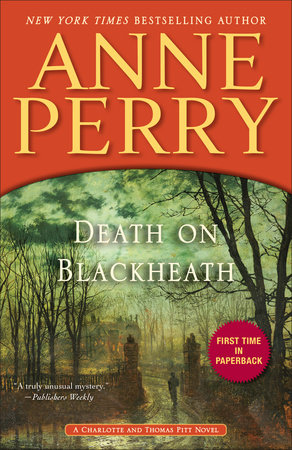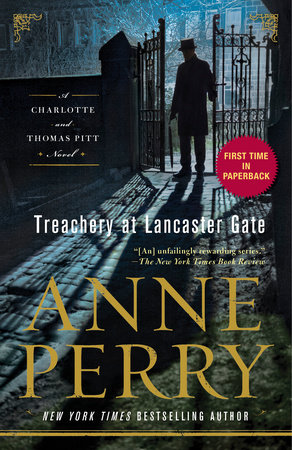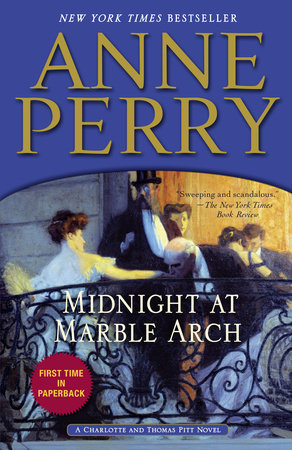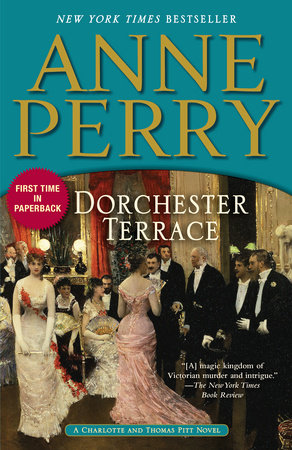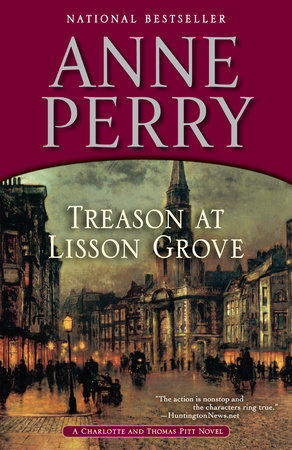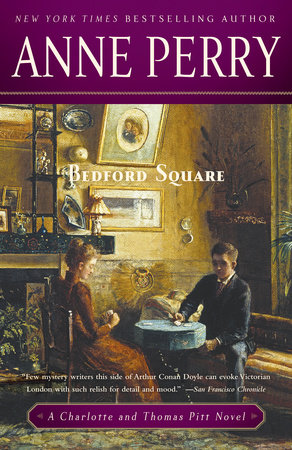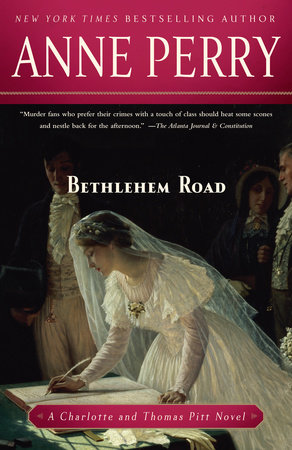Excerpt
Death on Blackheath
chapter
1
Pitt stood shivering on the steps leading up from the areaway to the pavement and looked down at the clumps of blood and hair at his feet. Splinters and shards of glass lay on the steps below and above him. There was blood on those as well, and some of it had already congealed. The January wind whined across the open stretch towards the gravel pits in the distance.
“And a maid seems to be missing?” Pitt asked quietly.
“Yes, and sorry, sir,” the police sergeant said unhappily. His young face was set hard in the gray early morning light. “Thought that seeing whose house it was, like, we should call you straightaway.”
“You did the right thing,” Pitt assured him.
They were in Shooters Hill, a very pleasant residential area on the outskirts of London. It was not far from Greenwich, where both the Naval College and the Royal Observatory from which the world took its time stood. The imposing house rising above them into the still, shadowed air was that of Dudley Kynaston, a senior government official deeply involved in matters of naval defense—a weapons expert of some kind. Violence so very close to his house was of concern to Special Branch, and thus to Pitt as its commander. It was a recent promotion for him and he was still uncomfortable with the extraordinary power it lent him. Perhaps he always would be. It was a responsibility that ultimately he could share with no one. His triumphs would be secret, his disasters appallingly public.
Looking down at the grim evidence at his feet, he would gladly have changed places with the sergeant beside him. He had been an ordinary young policeman himself when he had been this man’s age, twenty years ago. He had dealt with regular crimes then: theft, arson, occasionally murder—although not many with any political implications, and certainly none to do with terrible threats of violence towards the country and the government.
Pitt straightened up. He dressed much more smartly these days, if a little untidily, but even his new woolen coat could not dull the knife-edge of the wind. He was cold to the bone. The chill was blowing up from the river a mile and a half away, not hard, but with the steady bitterness of the damp. From this height he could see the low-lying stretches to the east shrouded in mist, and hear the mournful wail of foghorns.
“Did you say it was reported by the first servant to get up?” he asked. “That must have been hours ago.” He glanced at the wan daylight.
“Yes, sir,” the sergeant replied. “Scullery maid, slip of a thing, but sharp as a tack. Scared the poor child half out of her wits, all the blood and hair, but she kept her presence of mind.”
“She didn’t run all the way to the police station in the dark?” Pitt asked incredulously. “It must be a mile and a half at least, from here.”
“No, sir,” the sergeant responded with some satisfaction in his voice. “Like I said, she’s pretty coolheaded, and all of about thirteen, I would guess. She went in and woke up the housekeeper, a sensible sort of woman. She has the use of the telephone, so after she’d checked that the blood and hair were real, not just from some animals fighting or something similar, she called the police station. If she hadn’t, likely we’d still be on the way here.”
Pitt looked down at the blood, which could easily enough be human or animal. However, the strands of hair were long, auburn in the lantern light, and could only be human. The thought occurred to him that without the telephone to waken him at his home in Keppel Street on the other side of the river, he would have been having breakfast in his own warm kitchen now, unaware of any of this potential tragedy, and all the grief and complications that could arise from it.
He grunted agreement, but before he could add anything more he heard rapid footsteps along the pavement. The next moment, Stoker appeared at the top of the areaway. He was the one man in Special Branch that Pitt had learned to trust. After the betrayals that had led to Victor Narraway’s dismissal, he trusted no one who had not earned it. Narraway had been innocent of any wrongdoing and, after desperate effort and cost, had been proved so. But the events in Ireland had still been the end of his career at Special Branch.
“Morning, sir,” Stoker said with only the slightest curiosity in his voice. He glanced down at the lantern and the patch of stone steps illuminated by it, then at Pitt. He was a lean man with a strong, intelligent face, although it was a bit too bony to be good-looking, and too dour for charm.
“There was some sort of scuffle here, and a maid of the house appears to be missing,” Pitt explained. He looked up at the sky then back at Stoker. “Make a note of exactly what you see. Draw it. Then pick up a few samples, in case we need them in evidence one day. Better hurry. If the rain comes it’ll wash that whole lot away. I’m going in to speak to the household.”
“Yes, sir. Why us, sir? A quarrel, a missing maid—what’s wrong with the locals doing it?” He gave the sergeant a nod, but the question was directed at Pitt.
“Householder is Dudley Kynaston—naval defense . . .” Pitt replied.
Stoker swore under his breath.
Pitt smiled, glad not to have caught his exact words, although he probably agreed with them. He turned and knocked on the scullery door, then opened it, walking past the stored bins of vegetables and into the kitchen. Immediately the warmth wrapped around him, along with the rich aromas of food cooking. It was comfortable, everything in order. Polished copper pans hung from hooks, their sheen winking in the lights. Clean china was stacked on the dresser. Shelves were piled neatly with labeled spice jars. Strings of onions and dried herbs hung from the rafters.
“Good morning,” he said clearly, and three women turned from their tasks to look at him.
“Mornin’, sir,” they replied almost in unison. The cook was a comfortably rounded woman, at the moment holding a large wooden spoon in her hand. A maid in a starched and lace-trimmed apron was setting out tea and toast ready to carry upstairs, and another maid was peeling potatoes. She had dark, unruly hair and wide eyes. As soon as he saw her, Pitt knew that she was the one who had gone outside and found the blood and glass. The sleeves of her gray dress were rolled well above her elbows, and her white apron was covered in smuts from relighting the stove.
The cook regarded Pitt apprehensively, unsure where to place him in the social scale. He wasn’t a gentleman because he had come in through the back door, and he didn’t have the natural arrogance of a man used to the attention of servants. On the other hand, he seemed very sure of himself in a different kind of way, and she could tell at a glance that his overcoat was of excellent quality. In the circumstances, he was probably a policeman of some sort, but he did not look like an ordinary sergeant.
Pitt gave her a brief smile. “May I speak to your scullery maid, please? I would appreciate it if you could give me a quiet room where we will be without interruption. If you wish the housekeeper to be with her while we speak, that will be acceptable.” He phrased it as a request, but it was an order, and he held her eyes long enough to be certain that she knew that.
“Yes, sir,” she said, her voice catching as though her mouth were dry. “Dora here can go with her.” She gestured at the startled parlor maid. “I’ll take that tray up to Mrs. Kynaston. Maisie, you go with the policeman an’ tell ’im what ’e needs to know. And you be civil, mind!”
“Yes, Cook,” Maisie said obediently and led Pitt as far as the door. Then she turned to him, looking him up and down with bright, critical eyes. “You look like you’re froze to the bone. You want a cup o’ tea . . . sir?”
Pitt smiled in spite of himself. “Thank you, that would be very nice. Perhaps Dora would bring us a pot?”
Dora was strongly disapproving. She was a parlor maid, not someone to fetch and carry cups of tea to the likes of policemen and scullery maids, but she could not find the right words to say this, so she nodded in assent.
Pitt’s smile widened. “Thank you, very helpful of you.” He turned and followed Maisie along the corridor to the housekeeper’s sitting room. The housekeeper herself was no doubt about other duties necessitated by the alarming circumstances.
Pitt sat down in the armchair by the fire, which was newly lit and not yet warm. Maisie sat upright on the hard-backed chair opposite him.
“What time did you come down to the kitchen this morning?” Pitt started right away.
“ ’Alf past five,” she replied without hesitation. “I raked out the ashes an’ took ’em out ter the ash can in the yard. That was when I found the”—she gulped—“the blood . . . an’ that.”
“So you found the evidence at about quarter to six, would you say?”
“Yeah . . .”
“Was there anybody else nearby when you came out?”
She took a very deep breath, then let it out in a sigh. “Opposite’s boot boy was there, but ’e wouldn’t never ’ave done anything like that. ’Sides, ’e likes Kitty . . . I mean she were nice to ’im. ’E . . . ’e comes from the country an’ ’e misses ’is family, like.” Her dark eyes stared unwaveringly at Pitt.
“Who’s Kitty?” he asked.
“Kitty Ryder,” she said as if he should have known. “Mrs. Kynaston’s lady’s maid wot’s missing.”
“But how do you know for sure she’s missing?” he asked curiously. It was possible that this Kitty had gotten up that early to leave on some specific errand, he thought.
“ ’Cos she in’t ’ere,” she replied reasonably, but he knew from the defiance in her face and her very slight sniff that she was perfectly aware of being evasive. He decided to leave it for the time being.
“So your first thought was that the hair on the steps looked like Kitty Ryder’s?” he pressed.
“Yeah . . . some . . .”
“And you were afraid something had happened to Kitty?” he suggested.
“Yeah . . . I . . .” She stopped. She looked into his face and knew that somewhere there was a trap in the question, but she did not look away.
He heard Dora’s footsteps in the passage. He hurried to his next question, before Dora could come in with the tea and remain as a chaperone, perhaps keeping Maisie from saying everything she’d like to say.
“So you immediately thought it likely Kitty could have been on the areaway steps sometime in the middle of the previous night, and possibly have had a quarrel that turned violent? Did she have a suitor?”
“A wot?”
“A young man?”
Dora came in through the door balancing a tray with a teapot, milk jug, sugar bowl, and two cups and saucers. She placed it on the table and stood back a little, her face stiff with disapproval.
Pitt nodded his thanks but kept his eyes on Maisie. “A young man,” he repeated quickly. “I’m guessing Kitty had a young man and she went out at night to meet him. That was why when you saw the blood and hair you thought of her, and checked to see if she was home—and she wasn’t. Is that right?”
Maisie stared at him with respect, and a new fear. She nodded silently.
“Thank you,” Pitt acknowledged. “And did you find Kitty at all? Or any sort of note explaining where she had gone?” He asked that with a deep sense of impending sadness. Of course he already knew the answer.
Maisie shook her head. “She in’t nowhere.”
“Would you like a cup of tea?” he asked.
She nodded, still not taking her eyes from his face.


